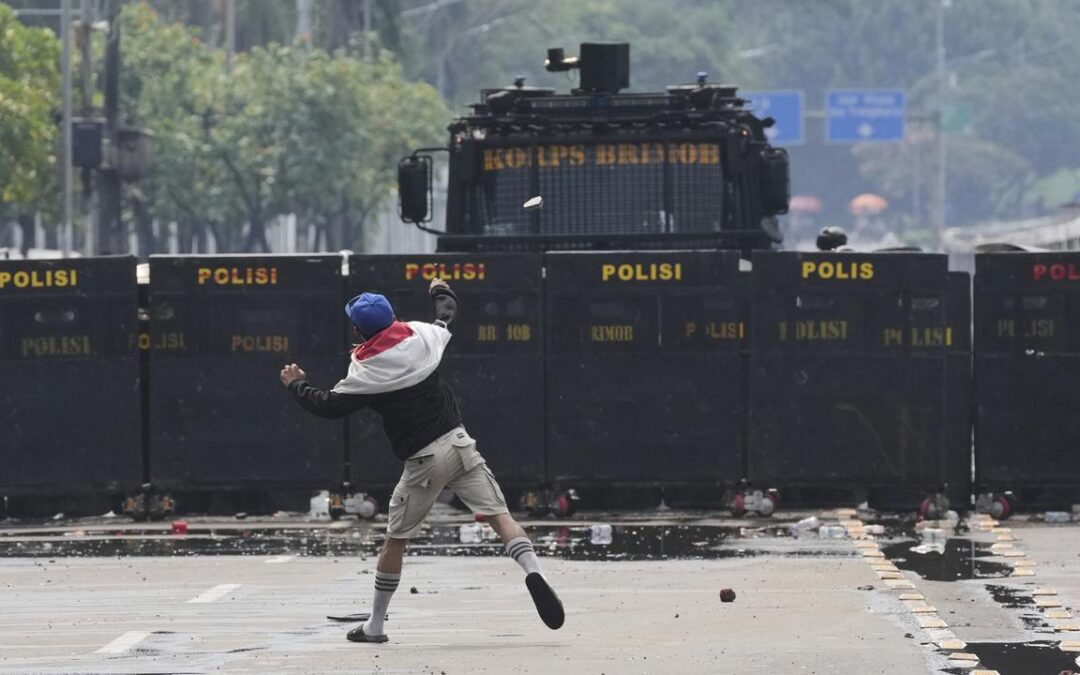
Indonesia accepts demand to cut MPs’ perks amid unrest
Indonesian political parties have agreed to revoke some perks and privileges for parliamentarians, President Prabowo Subianto says, in a major concession to anti-government protests that left five people dead.
Protests over what demonstrators termed excessive pay and housing allowances for parliamentarians started on Monday.
They expanded into riots on Thursday after one person – a motorcycle rideshare driver – was killed in police action at a protest site.
The homes of some political party members and state installations were ransacked or set ablaze.
Prabowo, speaking on Sunday at a news conference at the Presidential Palace and flanked by the leaders of various political parties, said he had ordered the military and police to take stern action against rioters and looters, warning that some of the actions were indicative of “terrorism” and “treason”.
“Leaders in parliament have conveyed that they will revoke a number of parliament policies, including the size of allowances for members of parliament and a moratorium on overseas work trips,” Prabowo said.
“To the police and the military, I have ordered them to take action as firm as possible against the destruction of public facilities, looting at homes of individuals and economic centres, according to the laws.”
The protests are the biggest test yet for Prabowo’s almost one-year-old government, which has faced little or no political opposition since taking power in October.
Subianto cancelled a planned trip to China as the protests spread further outside the capital Jakarta, with several regional parliament buildings set ablaze.
Prabowo had been due to attend a Victory Day parade in China on Wednesday to mark the 80th anniversary of the end of World War Two, following Japan’s formal surrender.
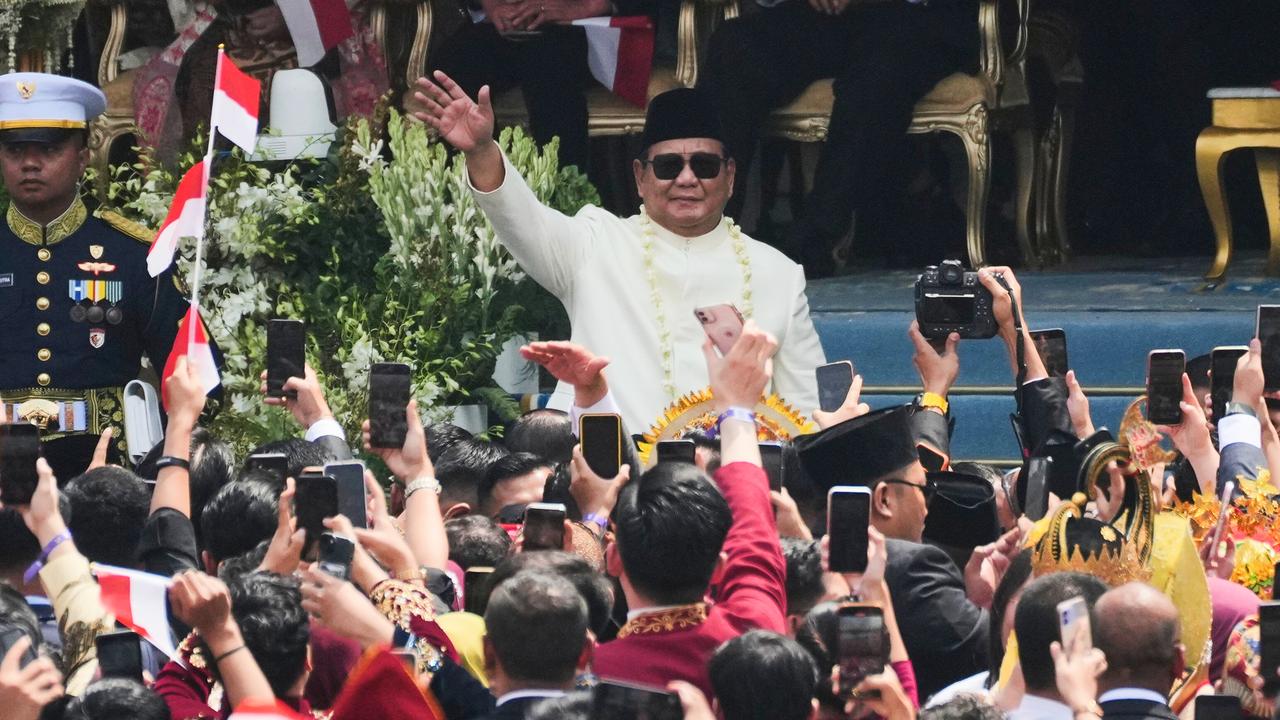
“The president wants to continue monitoring (the situation in Indonesia) directly … and seek the best solutions,” presidential spokesperson Prasetyo Hadi said in a video statement.
“Therefore, the president apologises to the Chinese government that he could not attend.”
Another consideration in cancelling the trip was a United Nations General Assembly session in September, Prasetyo said.
In light of the protest, short-video app TikTok, owned by China’s ByteDance, said on Saturday it had suspended its live feature in Indonesia for a few days.
Jakarta had this week summoned representatives of social media platforms, including Meta Platforms Inc and TikTok, and told them to boost content moderation because disinformation had spread online.
The government said such disinformation had spurred protests against it.
Protesters caused fires at regional parliament buildings in three provinces – West Nusa Tenggara, Pekalongan city in Central Java and Cirebon city in West Java – local media reported.
Demonstrations also occurred on the holiday island of Bali, where tear gas was used against protesters.
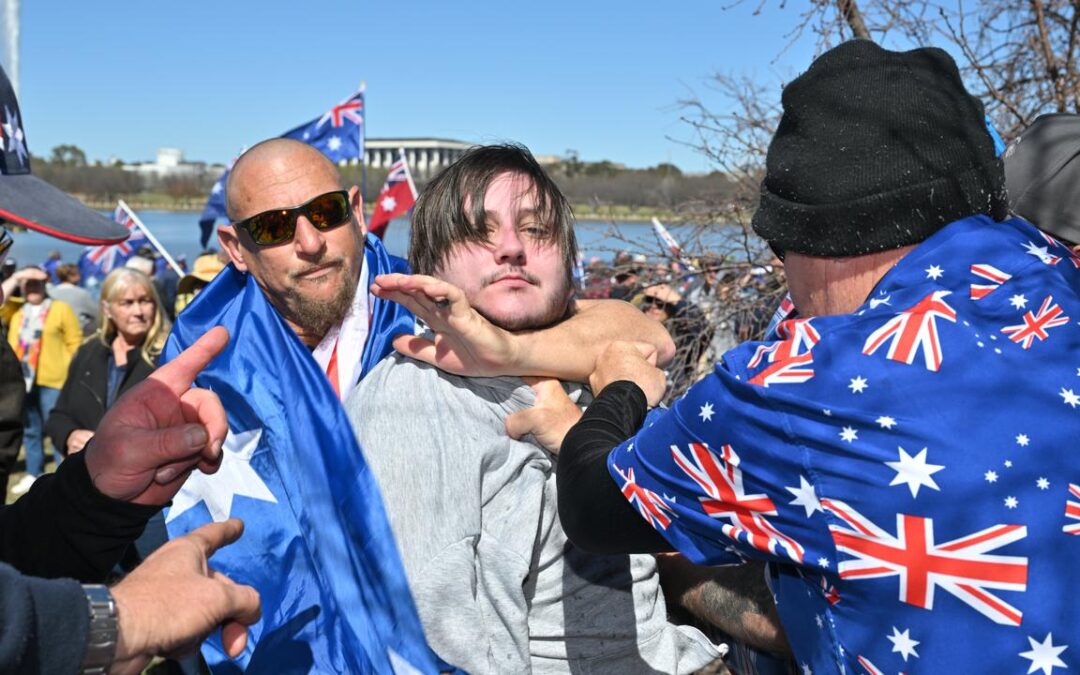
Brawls erupt as protesters clash at immigration rallies
Anti-immigration and counter protesters have clashed across Australia as thousands of nationalists took to the streets calling for a stop to mass migration.
March For Australia supporters donned Australian flags and shouted expletive-laden slogans, with neo-Nazis and right-wing politicians among those at the rallies.
Crowds across the country were mostly non-violent but police were forced to use pepper spray to separate some pro and anti-immigration protesters.
Protesters and speakers insisted they were not against immigration but wanted migration numbers reduced as nationalist slogans such as “love it or leave” and “Aussie, Aussie Aussie, oi, oi ,oi” were chanted.
One Nation leader Pauline Hanson received a rockstar welcome in the nation’s capital, where hundreds of people gathered at Commonwealth Park and marched across a bridge to Parliament House.
“If you don’t love it, I’ll be the first one to take you to the airport and put you on a plane,” the firebrand Queenslander told the crowd.
One man in the crowd was heard celebrating being kissed on the cheek by Senator Hanson when he asked for her small flag.
One Nation senator Malcolm Roberts also addressed the ACT crowd, which included a man on horseback, saying mass migration had made people “feel the death of Australian identity”.
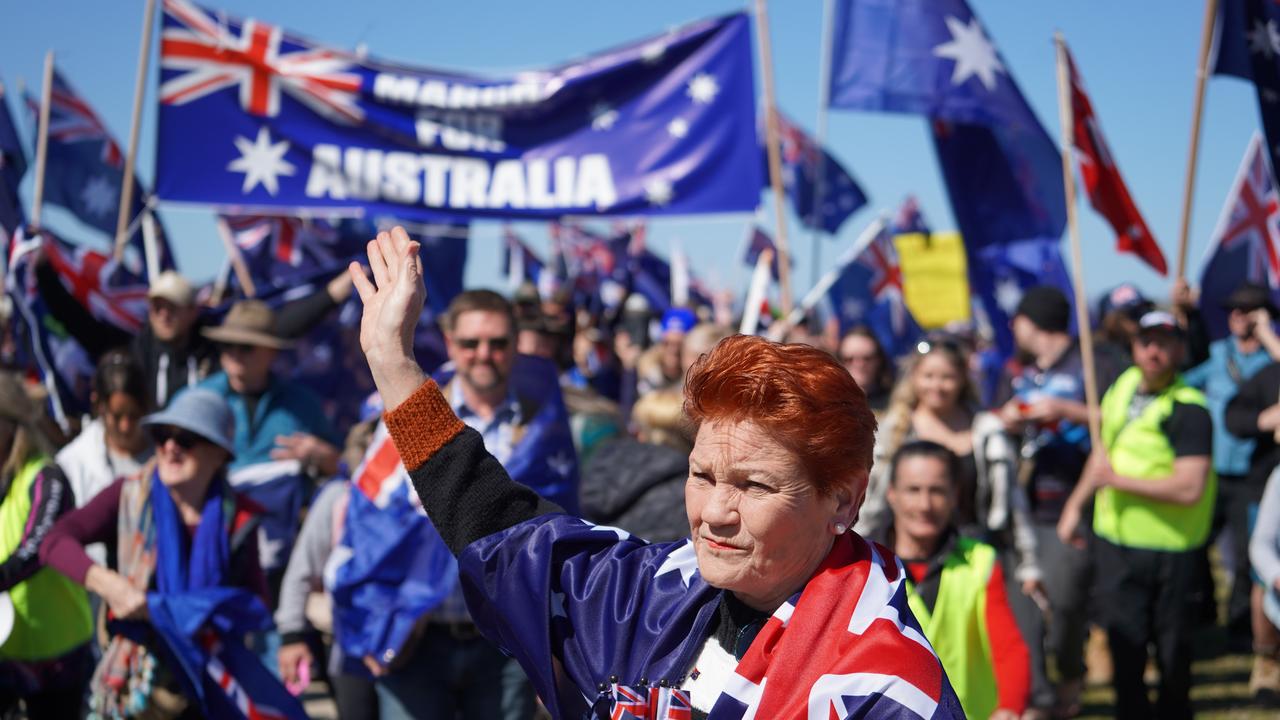
Counter-protesters chanted as crowds gathered before the march, screaming “f*** off Nazis, f*** off”, “go home white trash” and “immigrants are welcome here”.
An anti-fascism protester was also marched away by police after officers had to break up a scuffle in Canberra.
The man broke ranks to join the anti-immigration side and was put in a headlock by a man draped in an Australian flag.
Police were forced to separate protesters with pepper spray in Melbourne as the riot squad was deployed to manage clashes.
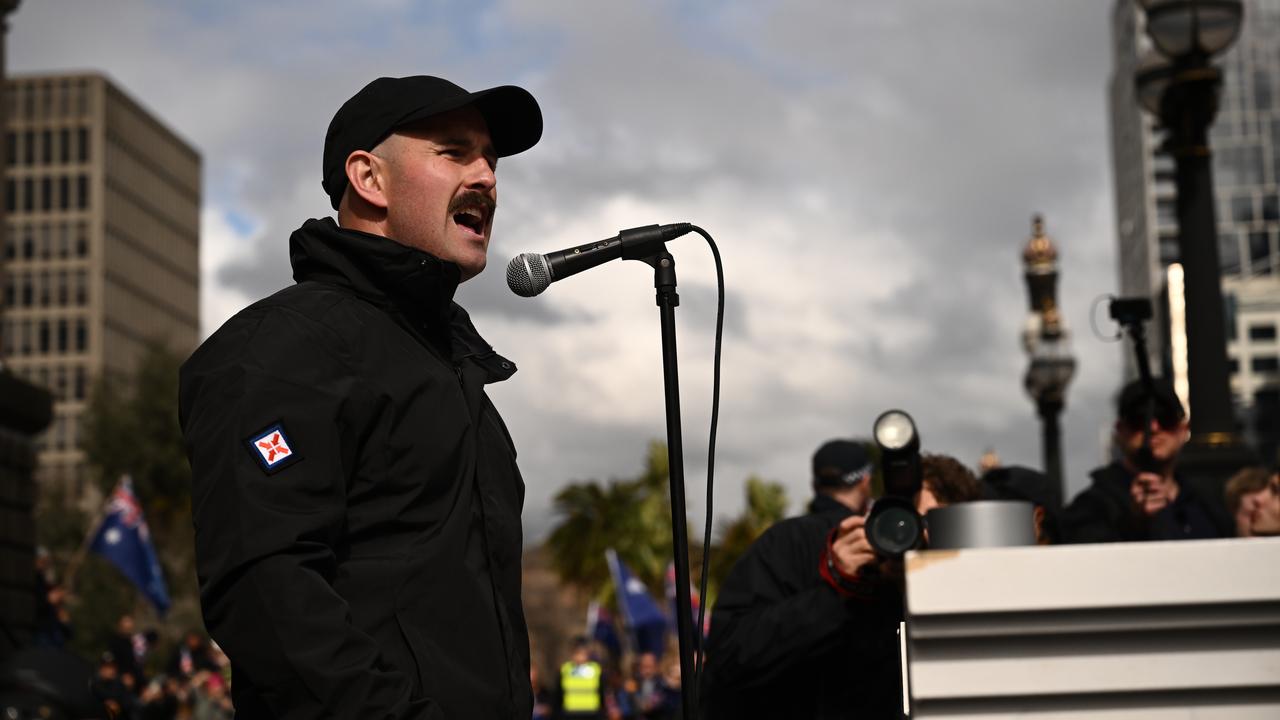
Neo-Nazi Thomas Sewell addressed a mostly male crowd that numbered in the thousands.
They congregated outside Flinders Street Station before marching through town.
A row of young men in uniformed black jackets and pants stood together, with one wearing a shirt marked with the words “f*** off we’re full”.
Victorian Police Minister Anthony Carbines described the anti-immigration marches as “grubby and hateful” and warned people who broke the law would be dealt with by authorities.
Thousands more people attended a rally in Sydney that ran alongside a weekly pro-Palestine protest and the city’s annual marathon.
NSW Libertarian MP John Ruddick called for a five-year immigration moratorium while another speaker spouted a conspiracy theory that there was “a clear global agenda to shame, beat down and replace people with Anglo-Celtic and European heritage”.
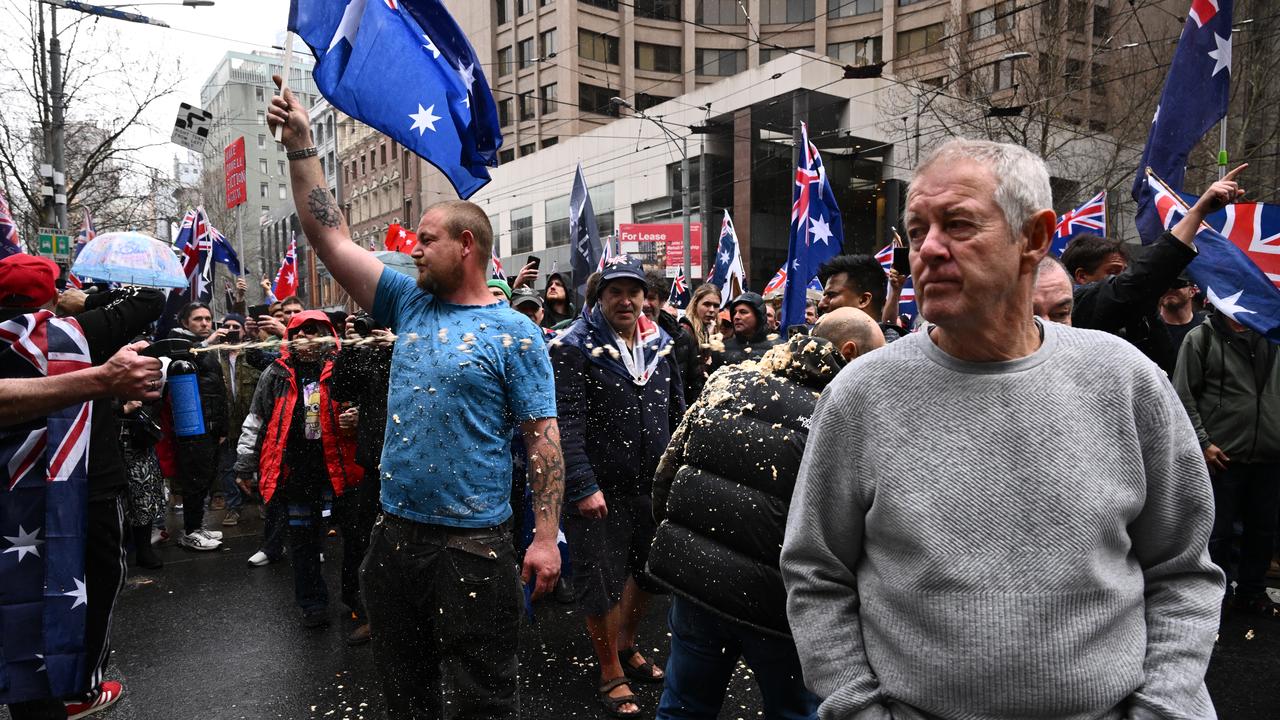
Police detained a woman hurling abuse at the pro-Palestine crowd and prevented her from joining the Hyde Park demonstration.
NSW Police said one arrest had been made for breaching the peace but no charges had been laid.
Crowds also gathered in Brisbane and Townsville, where renegade MP Bob Katter and state Katter’s Australia Party MPs Robbie Katter and Nick Dametto joined the march.
Ahead of the rallies, political leaders called for calm and warned violence and racism had no place in Australia.
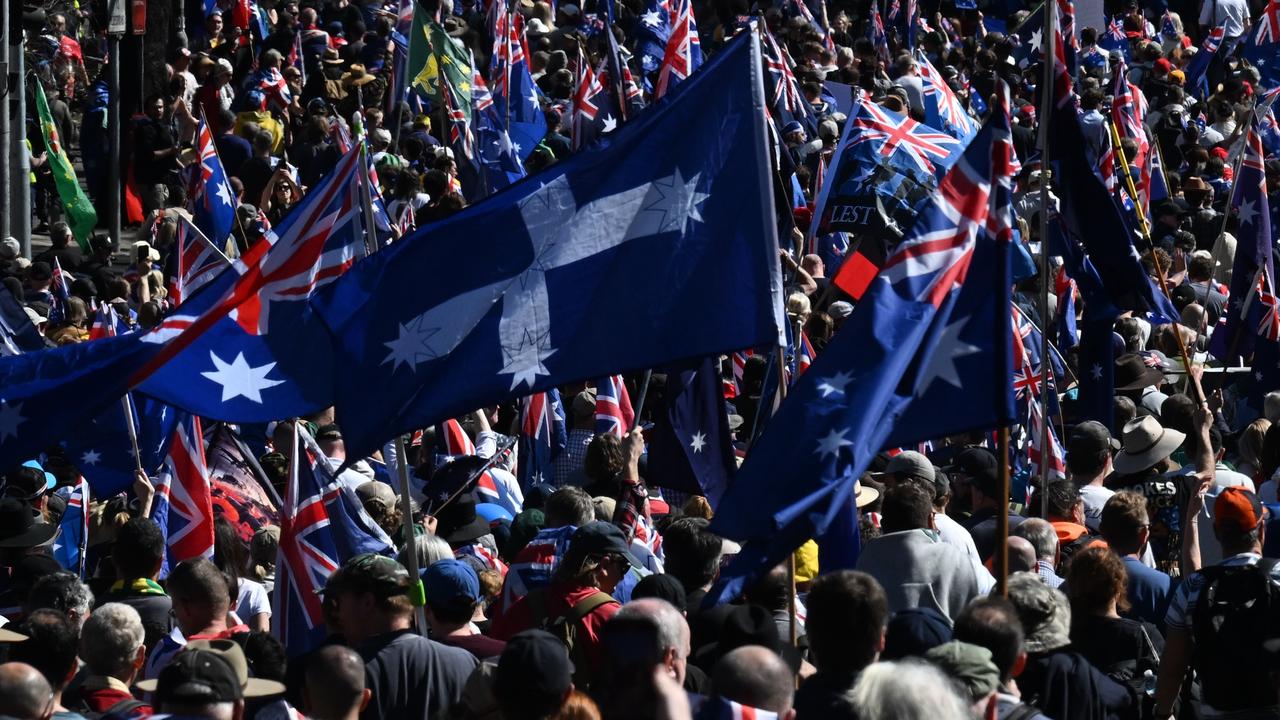
Cabinet minister Murray Watt said he “absolutely condemned” the anti-migrant rallies.
“The fact that this is being organised and promoted by neo-Nazi groups tells us everything we need to know about the level of hatred and division that these kind of rallies are about,” he said.
Liberal senator James Paterson, who has long championed strict migration laws, said many Australians held sincere views on the topic but warned neo-Nazis would be present at the rallies.
He expressed concern about the targeting of multicultural communities, including Indian Australians, labelling it shameful and wrong.
Opposition Leader Sussan Ley urged people not to let hatred and fear tear at the country’s social cohesion.

AC/DC blast sends Thunderstruck wolves fleeing
For millennia humans have tried to scare wolves away from their livestock. Most of them didn’t have drones.
But a team of biologists working near the California-Oregon border do, and they’re using them to blast AC/DC’s Thunderstruck, movie clips and live human voices at the apex predators to shoo them away from cattle in an ongoing experiment.
“I am not putting up with this anymore!” Scarlett Johansson yells in one clip, from the 2019 film Marriage Story that’s being used in the experiment.
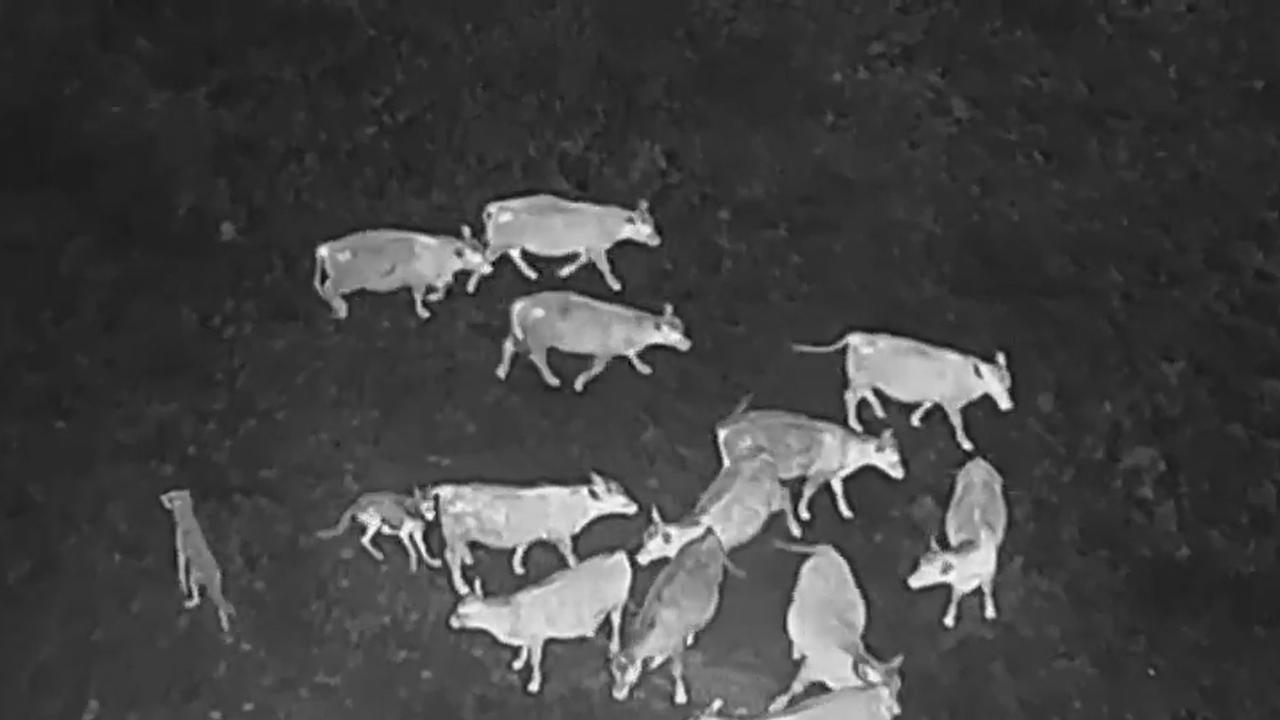
Gray wolves were hunted nearly to extinction throughout the US West by the first half of the 20th century.
Since their reintroduction in Idaho and at Yellowstone National Park in the mid-1990s, they’ve proliferated to the point that a population in the Northern Rockies has been removed from the endangered species list.
There are now hundreds of wolves in Washington and Oregon, dozens more in northern California, and thousands roaming near the Great Lakes.
The recovering population has brought increasing conflict with ranchers – and increasingly creative efforts by the latter to protect livestock.
They’ve turned to electrified fencing, wolf alarms, guard dogs, horseback patrols, trapping and relocating, and now drones. In some areas where nonlethal efforts have failed, officials routinely approve killing wolves, including last week in Washington state.
Scientists with the United States Department of Agriculture developed the techniques for hazing wolves by drone while monitoring them using thermal imaging cameras at night, when the predators are most active.
A preliminary study released in 2022 demonstrated that adding human voices through a loudspeaker rigged onto a drone can freak them out.
The preloaded clips include recordings of music, gunshots, fireworks and voices.
A drone pilot starts by playing three clips chosen at random, such as the Marriage Story scene or Thunderstruck, with its screams and hair-raising electric guitar licks.
If those don’t work, the operator can improvise by yelling through a microphone or playing a different clip that’s not among the randomised presets.
Environmental advocates are optimistic about drones because they allow for scaring wolves in different ways, in different places.
“Wolves are frightened of novel things,” said Amaroq Weiss, a wolf advocate with the Center for Biological Diversity.
Ranchers in Northern California who have hosted drone patrols agree that they have reduced livestock deaths so far.
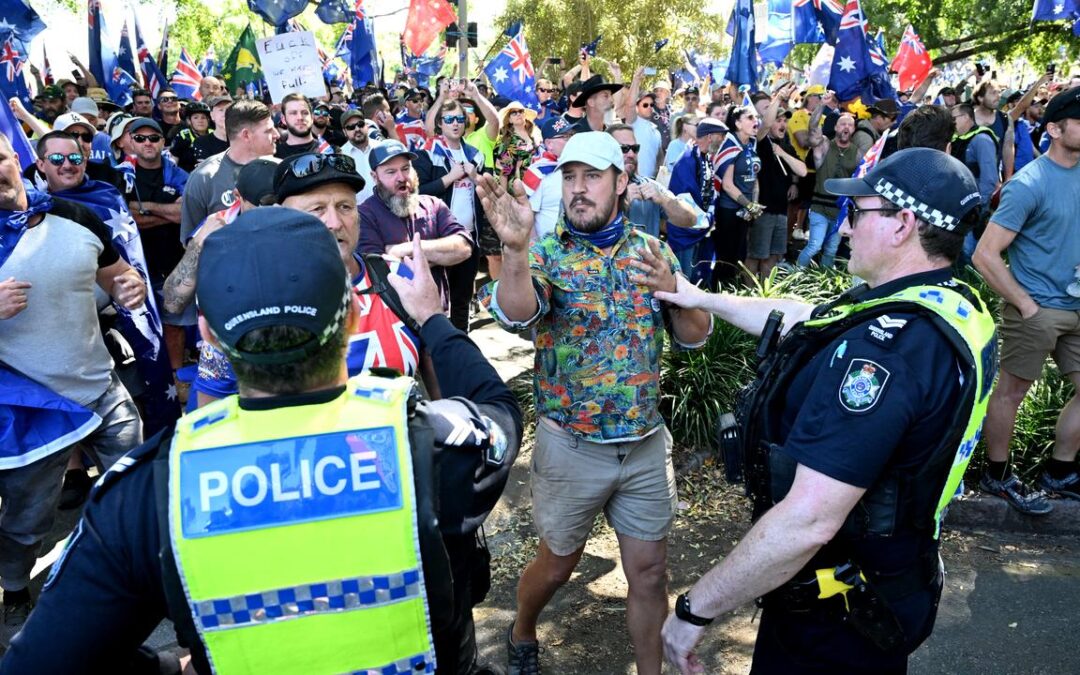
Tensions flare as thousands attend anti-migrant rallies
Draped in flags and shouting expletive-laden slogans, thousands of people have attended anti-immigration rallies across Australia.
The nationwide marches also drew large numbers of counter-protesters, with police forced to separate the crowds.
In Melbourne, a mostly male crowd numbered in the thousands congregated outside Flinders Street Station waving Australian flags before marching through town.
A row of young men in uniformed black jackets and pants stood together, with one wearing a shirt marked with the words “f*** off we’re full”.
Police were out in force to separate the march from an anti-racist counter-protest, with pepper spray deployed and horses used to keep them apart.
Victorian Police Minister Anthony Carbines described the anti-immigration marches as “grubby and hateful”.
Anyone who broke the law would be dealt with by authorities, he warned.
Thousands more people attended a rally in Sydney, where some carried signs saying ‘Albo’s got to go’ while crowds also gathered in Brisbane.
A few hundred people turned out in Canberra, where One Nation leader Pauline Hanson addressed the crowd to speak about loving Australia.
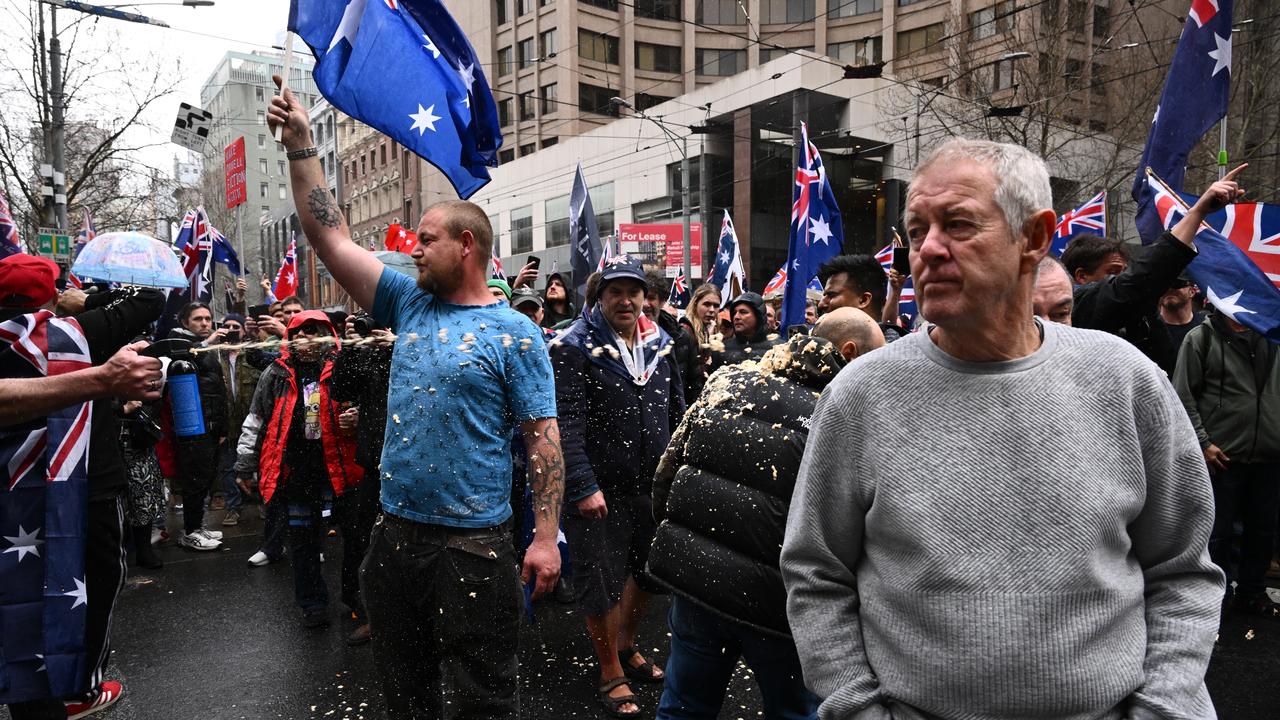
“If you don’t love it, I’ll be the first one to take you to the airport and put you on a plane,” she said.
The Queensland firebrand was elected to federal parliament more than three decades ago following a campaign against Asian migration.
Her colleague Malcolm Roberts also addressed the ACT crowd.
“We all feel the death of Australian identity,” he said.
“Mass immigration is not in Australia’s interests.”
Ahead of the rallies, political leaders called for calm and warned violence and racism had no place in Australia.
“We cannot let hatred and fear tear at our social cohesion,” federal opposition leader Sussan Ley said.
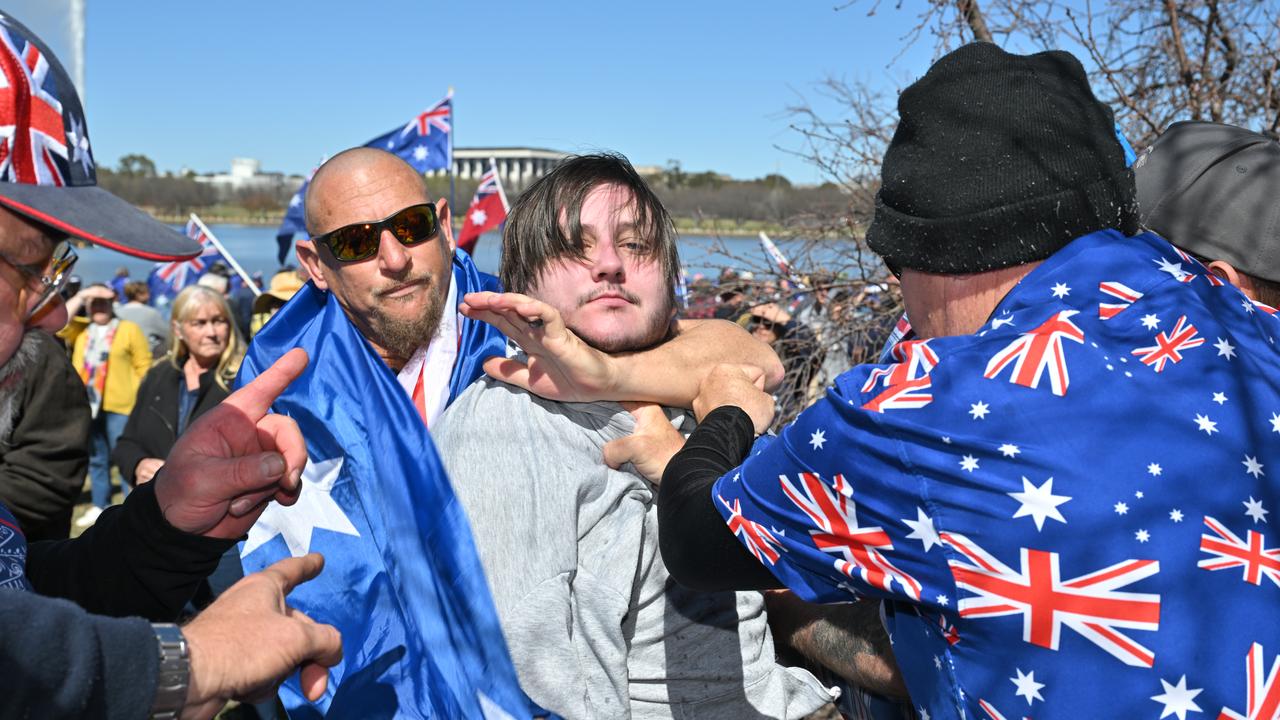
Cabinet minister Murray Watt said he “absolutely condemned” the anti-migrant rallies.
“The fact that this is being organised and promoted by neo-Nazi groups tells us everything we need to know about the level of hatred and division that these kind of rallies are about,” he said.
Liberal Senator James Paterson, who has long championed strict migration laws, said many Australians held sincere views on the topic.
However, he warned neo-Nazis would be present at the rallies, and expressed concern about the targeting of multicultural communities including Indian Australians, labelling it shameful and wrong.
NSW Police had their work cut out for them with hundreds of officers deployed across the Sydney marathon, a weekly pro-Palestine rally and the anti-immigration march in different parts of the city.
Commanders warned there would no tolerance for violent acts or criminal behaviour.
Ahead of the marches, a flurry of social media posts claimed 1500 migrants were arriving in Australia each day, which was repeated on talkback radio.
However, the Australian Bureau of Statistics questioned the use of migration numbers, warning they were not an accurate reflection of immigration.
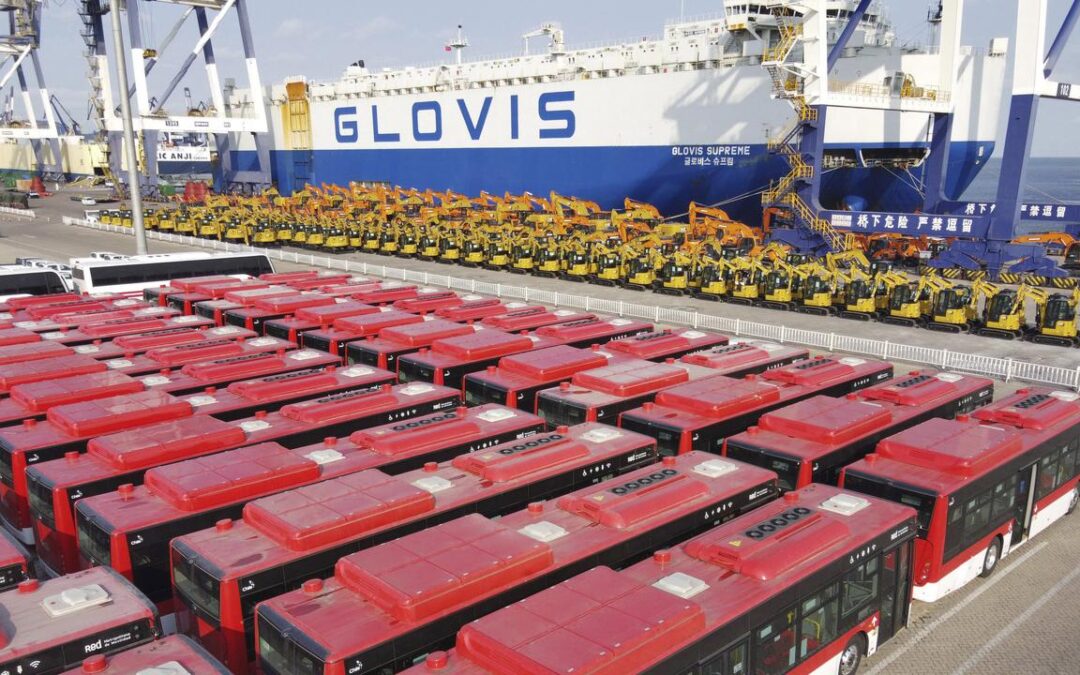
China’s manufacturing activity shrinks again
China’s manufacturing activity shrank for a fifth straight month in August, suggesting producers are waiting for further clarity on a trade deal with the US while domestic demand remains sluggish.
The official purchasing managers’ index (PMI) rose to 49.4 in August versus 49.3 in July, remaining below the 50-mark separating growth from contraction and missing a median forecast of 49.5 in a Reuters poll.
China’s economy is confronting weakening exports due to US tariffs, a property sector downturn, rising job insecurity, heavily indebted local governments and extreme weather. These pressures threaten to derail Beijing’s ambitious 2025 growth target of “around five per cent”, according to economists.
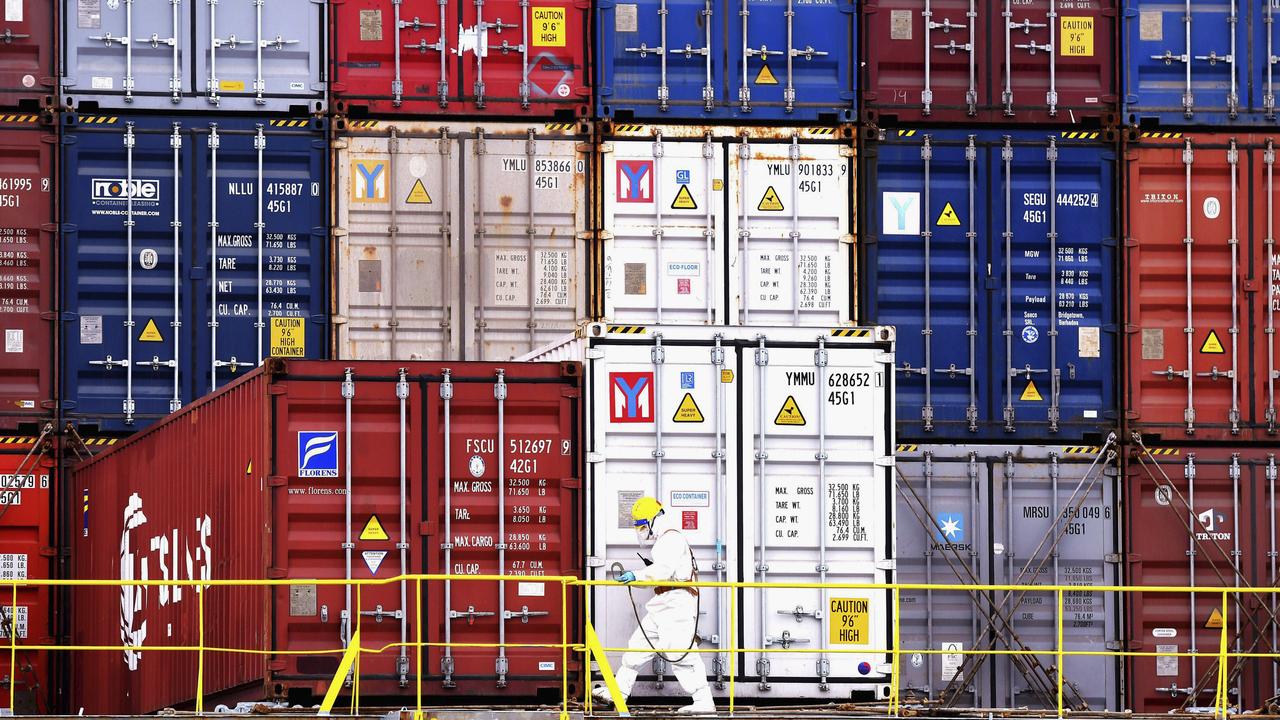
The non-manufacturing PMI index, which includes services and construction, expanded at a quicker pace, rising to 50.3 from 50.1 in August, according to the National Bureau of Statistics (NBS).
The NBS composite PMI of manufacturing and non-manufacturing was 50.5 in August, compared with 50.2 in July.
While July exports beat forecasts, the gain was supported by a low base and driven by a surge in shipments to Southeast Asia, as Chinese exporters scramble to grow market share there amid fears of losing access to the US, the world’s top consumer market – a push some producers have called a “mad rat race”.
Earlier this month, the US and China extended their tariff truce for another 90 days, locking in place levies of 30 per cent on Chinese imports and 10 per cent Chinese duties on US goods, but the uncertainty is eroding confidence on both sides of the Pacific.
Profits at China’s industrial firms fell for a third straight month in July, official data showed on Wednesday, highlighting how businesses are also struggling with subdued demand and persistent factory-gate deflation at home, keeping the pressure on Beijing to roll out more stimulus.
Policymakers have ramped up consumer subsidies, but a prolonged property slump is still crimping spending, with real estate a key store of household wealth.
Households’ reluctance to take out mortgages was reflected in July bank lending data, which unexpectedly contracted for the first time in 20 years.
And consumer spending could take a further hit if a recent ruling by China’s top court banning firms and employees from skirting social insurance payments leads to job losses, with many companies and workers already struggling to make ends meet. Urban unemployment edged up to 5.2 per cent in July from five per cent in June.
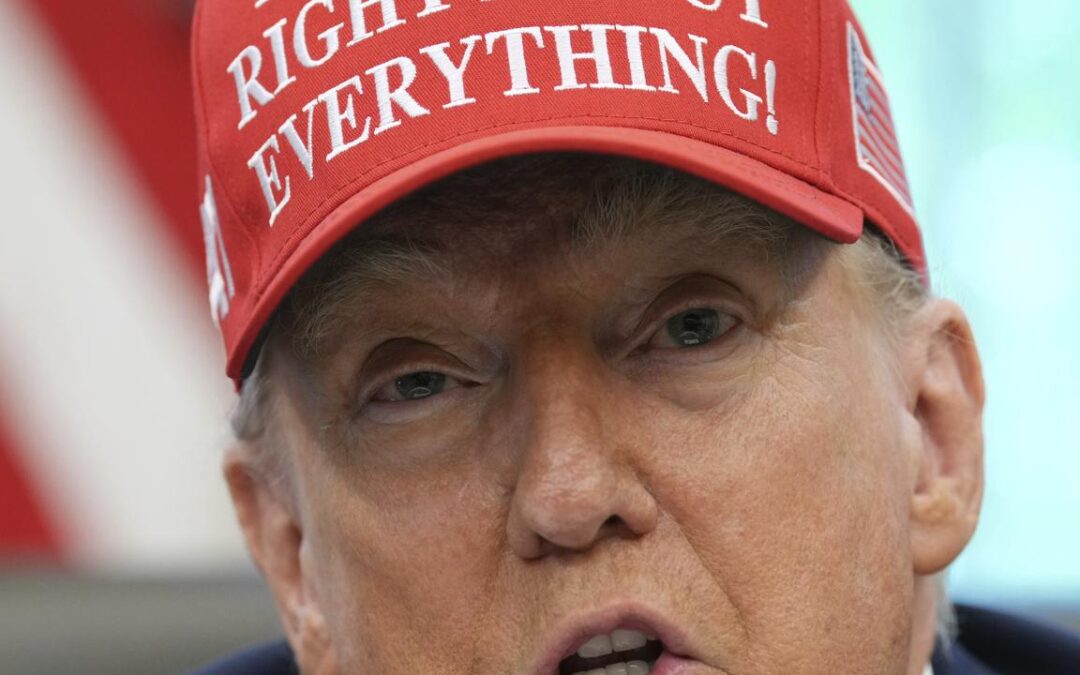
Trump says he will order voter ID requirement
President Donald Trump says he will issue an executive order requiring voter identification from every US voter.
“Voter I.D. Must Be Part of Every Single Vote. NO EXCEPTIONS! I Will Be Doing An Executive Order To That End!!!,” Trump said on Truth Social.
“Also, No Mail-In Voting, Except For Those That Are Very Ill, And The Far Away Military,” he added.
Trump has long questioned the US electoral system and continues to falsely claim that his 2020 loss to Democratic President Joe Biden was the result of widespread fraud.
The president and his Republican allies also have made baseless claims about widespread voting by non-citizens, which is illegal and rarely occurs.
For years, he has also called for the end of electronic voting machines, pushing instead for the use of paper ballots and hand counts – a process that election officials say is time-consuming, costly and far less accurate than machine counting.
Earlier in August, Trump pledged to issue an executive order to end the use of mail-in ballots and voting machines ahead of the 2026 midterm elections. However, federal elections are administered at the state level and it is unclear whether the president has the constitutional power to enact such a measure.
The November 2026, elections will be the first nationwide referendum on Trump’s domestic and foreign policies since he returned to power in January. Democrats will be seeking to break the Republicans’ grip on both the House of Representatives and the Senate to block Trump’s domestic agenda.
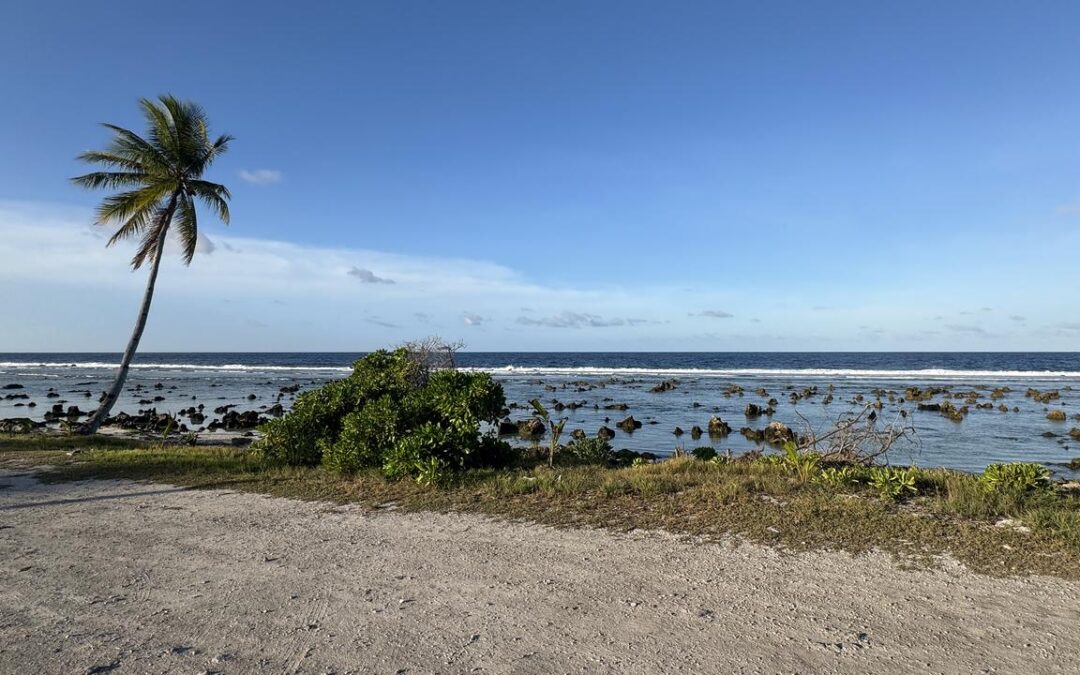
Hundreds of former immigration detainees to be deported
Hundreds of former immigration detainees will be deported to Nauru under a controversial deal that has secured bipartisan support.
The pact will cost Australian taxpayers more than $400 million up front and then $70 million ongoing each year.
It will allow Australia to transfer about 280 former detainees including convicted criminals to the tiny Pacific island, which has a population of about 12,000.
Human rights groups and the Greens have condemned the agreement, which was signed by Home Affairs Minister Tony Burke.
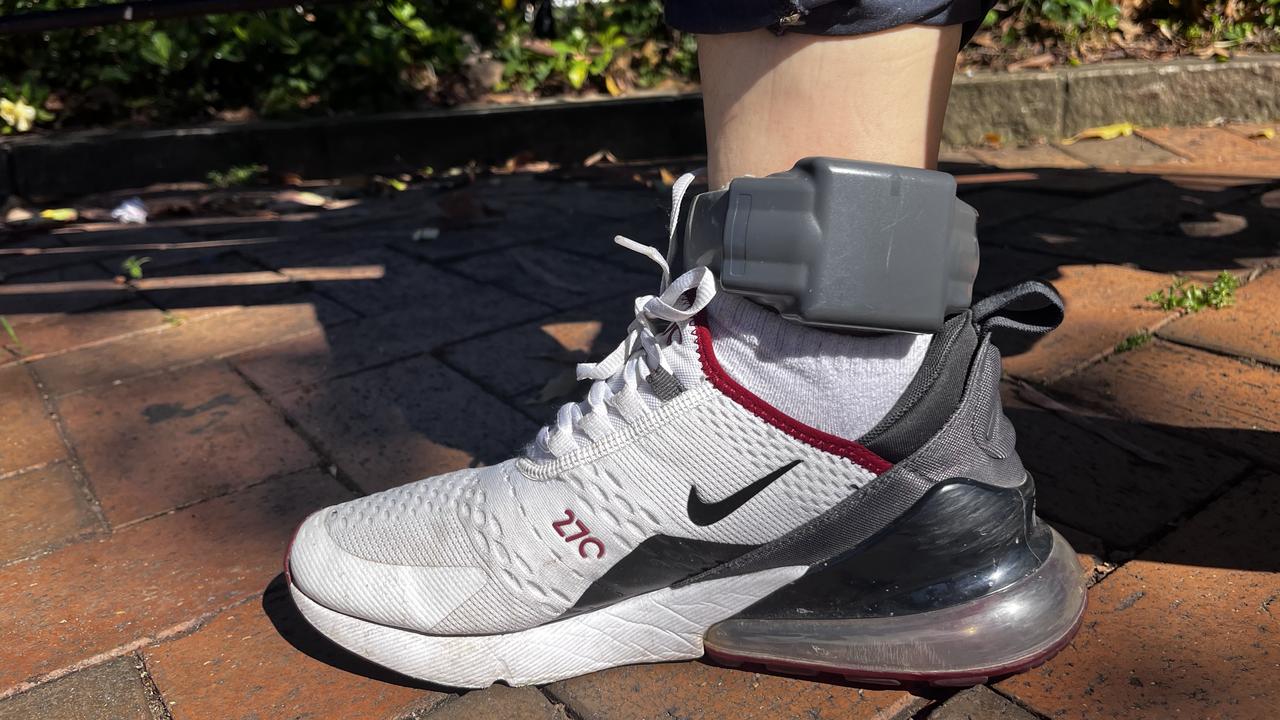
The deal impacts several hundred people known as the NZYQ cohort, who were released from custody following a landmark High Court ruling on indefinite detention.
Shadow attorney-general Julian Leeser said it was a “legitimate arrangement”.
“This cohort of people have had ample opportunities to put their case,” he told the ABC on Sunday.
“They have exhausted all appeal avenues and the question now is whether they can be removed to another country.”
Greens immigration spokesman David Shoebridge condemned the agreement.
“This is another secret deal,” he said.
“This time a $400 million secret deal, that Labor signed with Nauru to literally turn Nauru into a 21st century prison colony.”
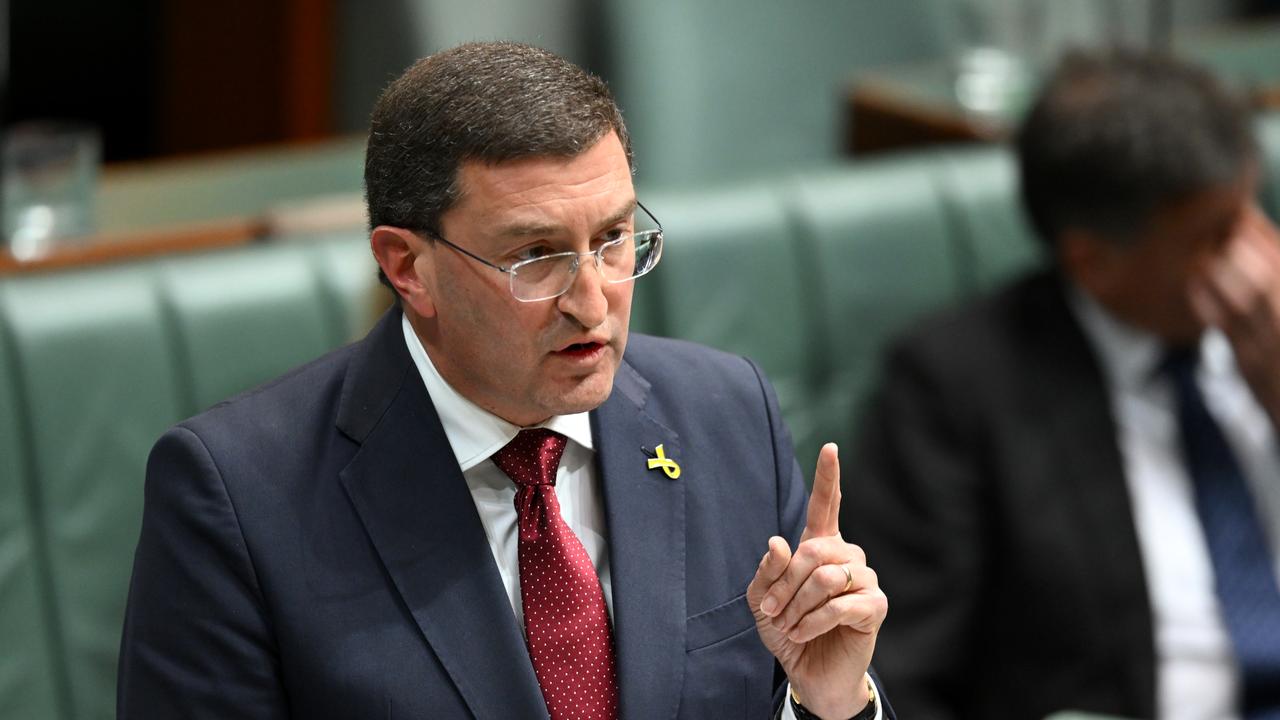
The federal government must pass legislation to allow for the removals.
Cabinet minister Murray Watt wants to make progress as soon as possible.
“It’s not the intention to send the entire cohort in one group,” he told Sky News.
“The plan is to scale the number up and allow Nauru to put in place the systems that allow for the number to increase over time.”
Senator Watt rejected suggestions Australia was dumping unwanted people including criminals on Nauru.
“Nauru is an independent sovereign nation,” he said.
“It can make its own decisions about what it wants to do, and the fact that they have reached that agreement with Australia does solve this issue.”
The home affairs minister visited Nauru to meet its president and members of parliament before signing the memorandum of understanding.
The agreement “contains undertakings for the proper treatment and long-term residence of people who have no legal right to stay in Australia, to be received in Nauru”.
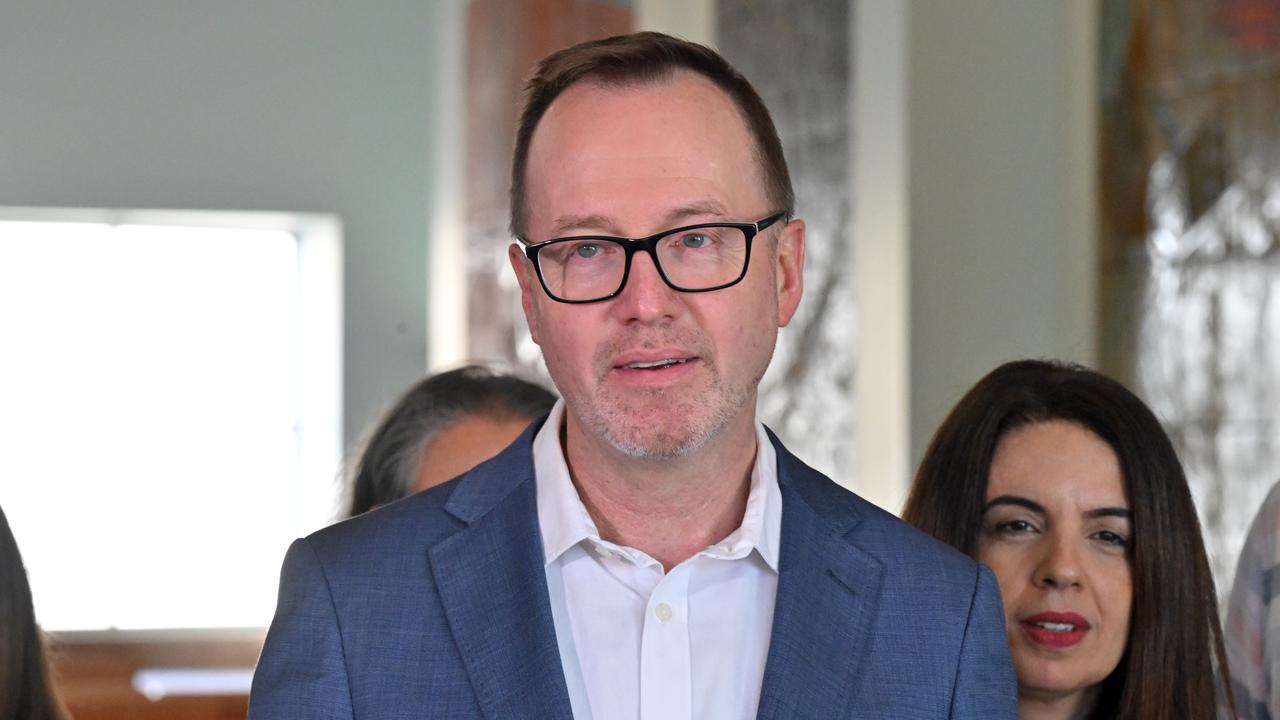
The price tag attached to the resettlement deal is significant in the context of the Nauru economy, which has a GDP of $160 million USD.
Refugee and human rights advocates warn the deal removes procedural fairness and may open the door to mass deportations.
A group of lawyers and academics said the government was dismantling legal protections.
Australia’s human rights commission raised concerns the government’s proposal to change migration rules in its bid to deport the former detainees could strip the right to fair process.
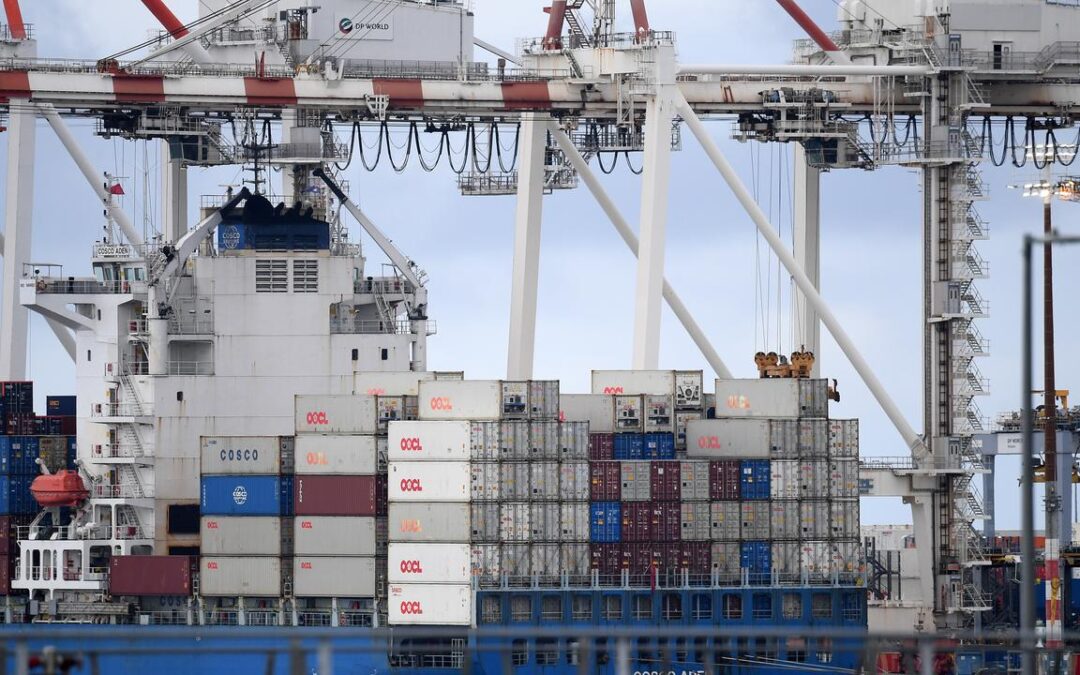
Nation’s economic pulse check dominates data-heavy week
Australia’s economic pulse will be revealed as national accounts figures dominate a busy data week.
GDP growth is expected to continue its gradual recovery since bottoming last year at 0.8 per cent year-on-year – the slowest rate in decades excluding COVID-19.
AMP deputy chief economist Diana Mousina forecasts Wednesday’s Australian Bureau of Statistics release will show the national economy grew 0.6 per cent in the three months to June, which would lift the annual rate from 1.3 per cent to 1.7 per cent.
Slightly soft capital expenditure and slightly strong construction work-done figures released by the ABS last week balanced each other out.
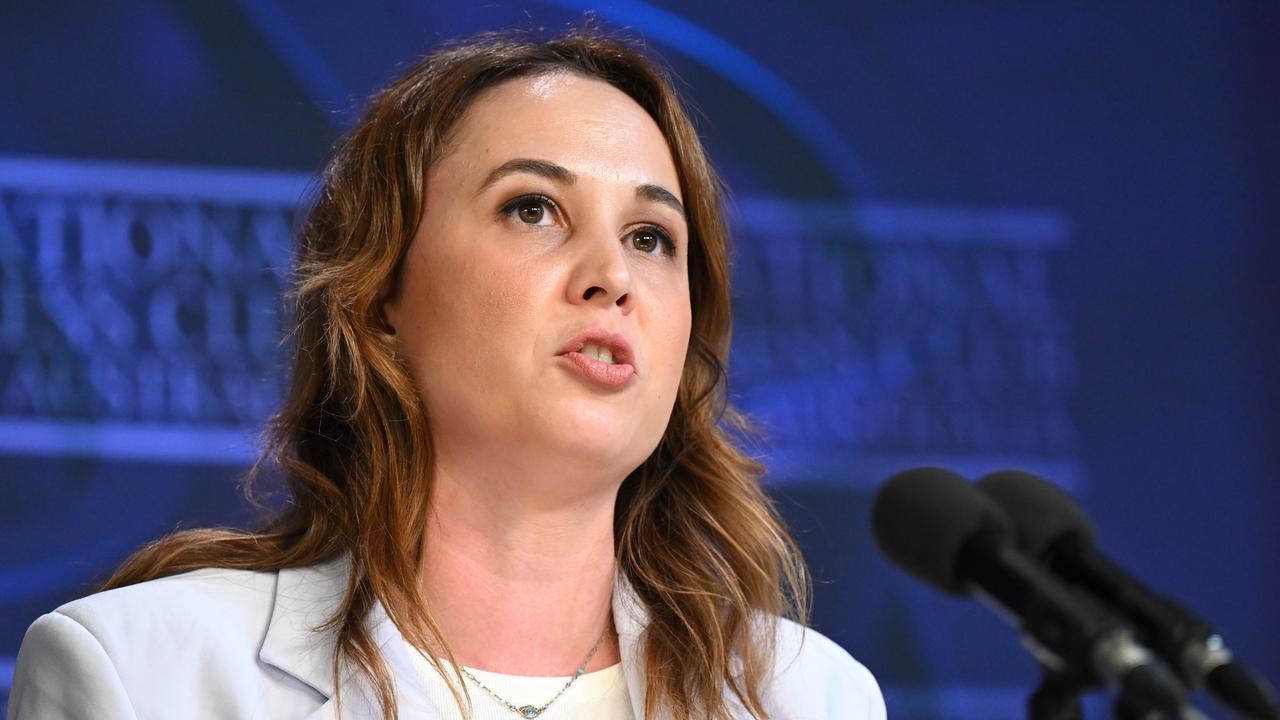
But harder-to-forecast business inventories and public spending data, due Monday and Tuesday, still pose a risk to her forecast.
Public spending has been slowing in recent months as some large-scale infrastructure projects wound down.
An uptick in private demand has failed to pick up the slack.
“I think the private sector is still incredibly weak,” Ms Mousina told AAP.
“It is a bit of a risk that the GDP numbers stay pretty weak. We could see them running at a lower level than the RBA is expecting for a while.”
The Reserve Bank of Australia estimated the economy would grow 1.6 per cent over the year to June earlier this month.
NAB economists expect GDP growth to undershoot that prediction at 1.4 per cent, although CBA, ANZ and the market anticipate annual growth of 1.7 or 1.8 per cent.
But even if economic growth does come in below forecast, borrowers shouldn’t think another rate cut imminent, following last week’s shock jump in monthly inflation, Ms Mousina said.
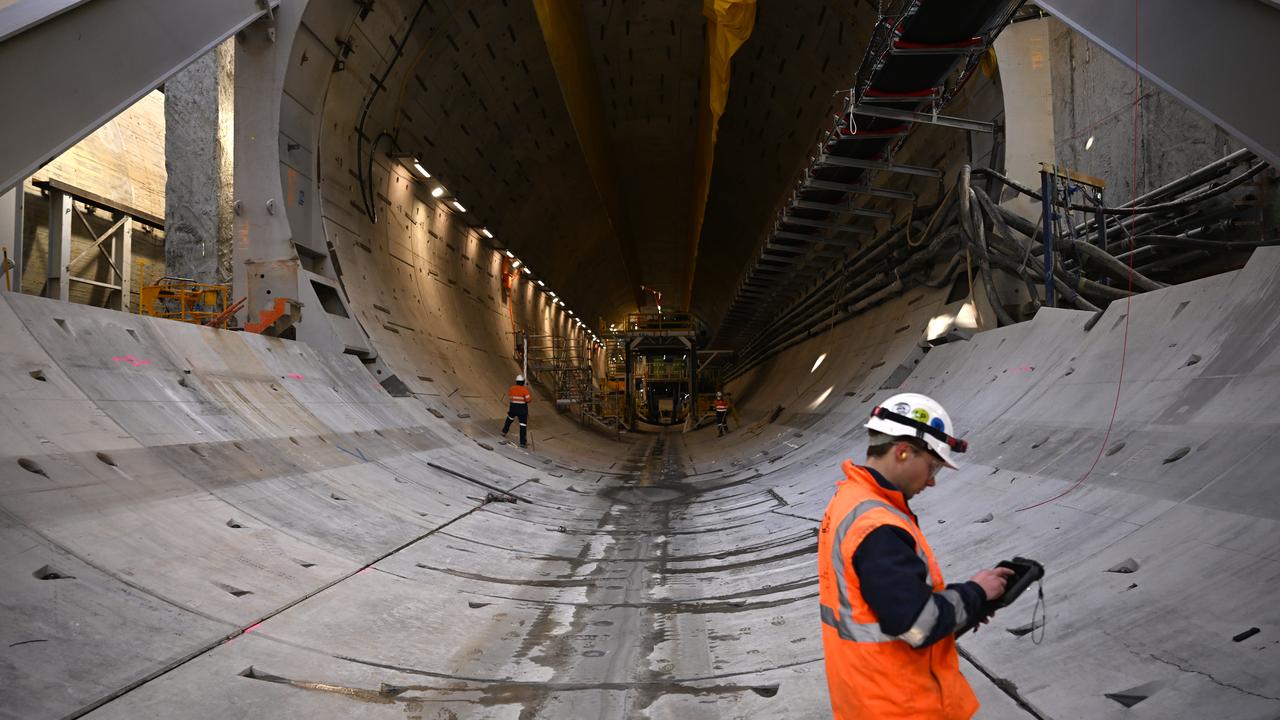
Despite RBA staff downgrading their medium-term productivity assumption earlier in August, Australia is still likely to be in negative year-on-year productivity growth.
The RBA has been concerned that lagging productivity could flow through to higher labour costs and inflation.
But Westpac senior economist Pat Bustamante noted that “the fall in aggregate productivity has been skewed by the expansion of the non-market sector, which has a significantly lower level of ‘measured’ productivity”.
This is something which has also declined in the resources sector, with miners running down capital stock and increasingly exploiting lower-grade projects due to booming commodity prices.
Investors won’t have to wait long to hear from the RBA, with governor Michele Bullock to deliver an address in Perth Wednesday evening.
On Thursday, deputy governor Andrew Hauser will also be closely watched in an interview with Reuters.
The same day, the ABS will release its household spending indicator for the first time since it ceased its long-running but less comprehensive retail trade series.
Housing data will also take prominence this week.
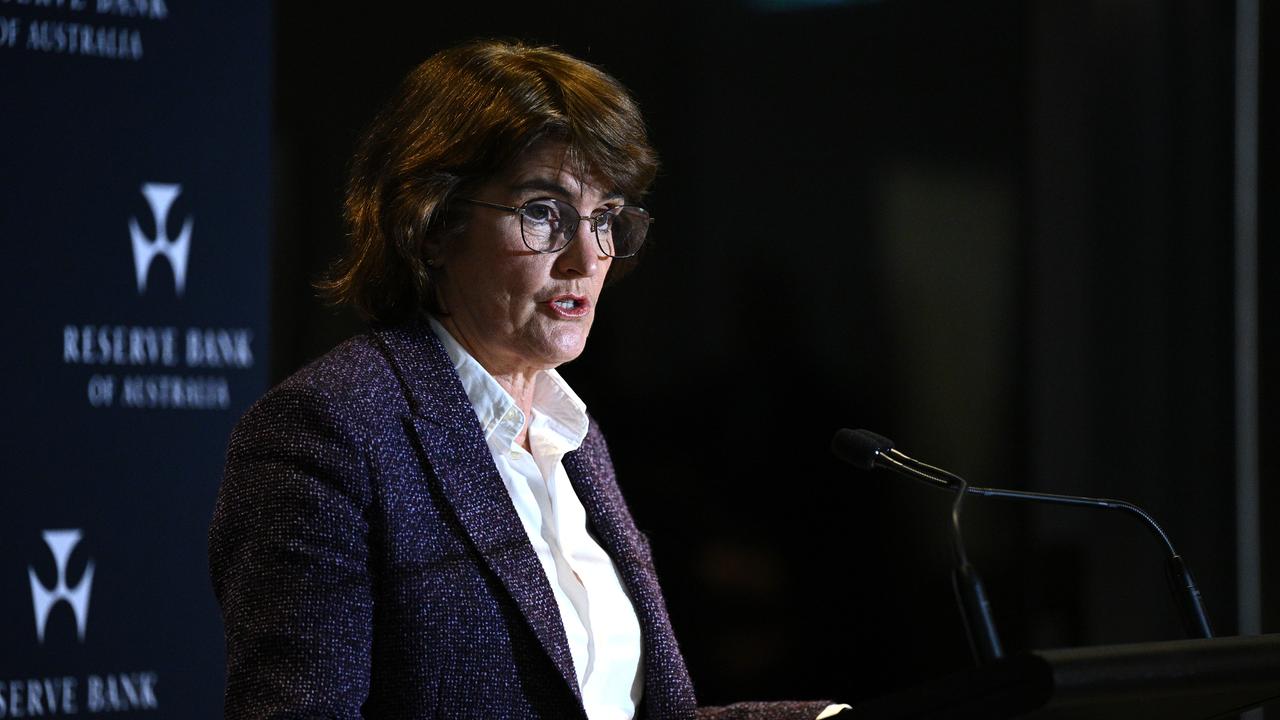
Monday will see Cotality update its Home Value Index for August and the ABS release building approval figures for July.
Wall Street investors are meanwhile mulling inflation data showing US tariffs have started feeding into prices.
The S&P 500 declined 0.64 per cent to end Friday at 6,460.26 points a day after notching a record-high close, while the Nasdaq declined 1.15 per cent to 21,455.55 points and the Dow shed 0.20 per cent to 45,544.88 points.
US indices will be closed Monday for Labour Day.
Australian share futures climbed 25 points, or 0.28 per cent, to 7,922.
The benchmark ASX200 index on Friday lost 6.9 points, or 0.08 per cent, to 8,973.1, while the broader All Ordinaries gained 1.9 points, or 0.02 per cent, to 9,243.
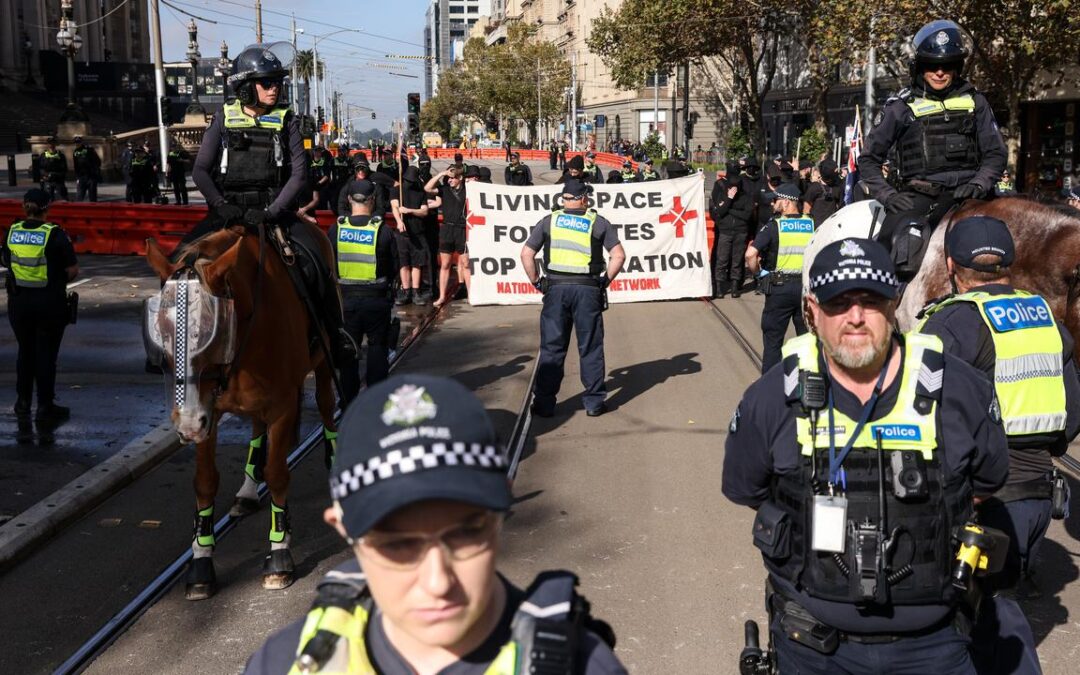
‘No place for racism’: leaders condemn divisive rallies
Leaders from across the political spectrum have condemned anti-migration rallies, warning violence and racism have no place in Australia.
Federal opposition leader Sussan Ley called for calm ahead of March for Australia events across the nation.
“There is no place for violence, racism or intimidation,” Ms Ley said.
“Whether incited from afar or stirred up here, we cannot let hatred and fear tear at our social cohesion.
“It (Australia) belongs to all of us, and what unites us will always be stronger than what seeks to divide us.”
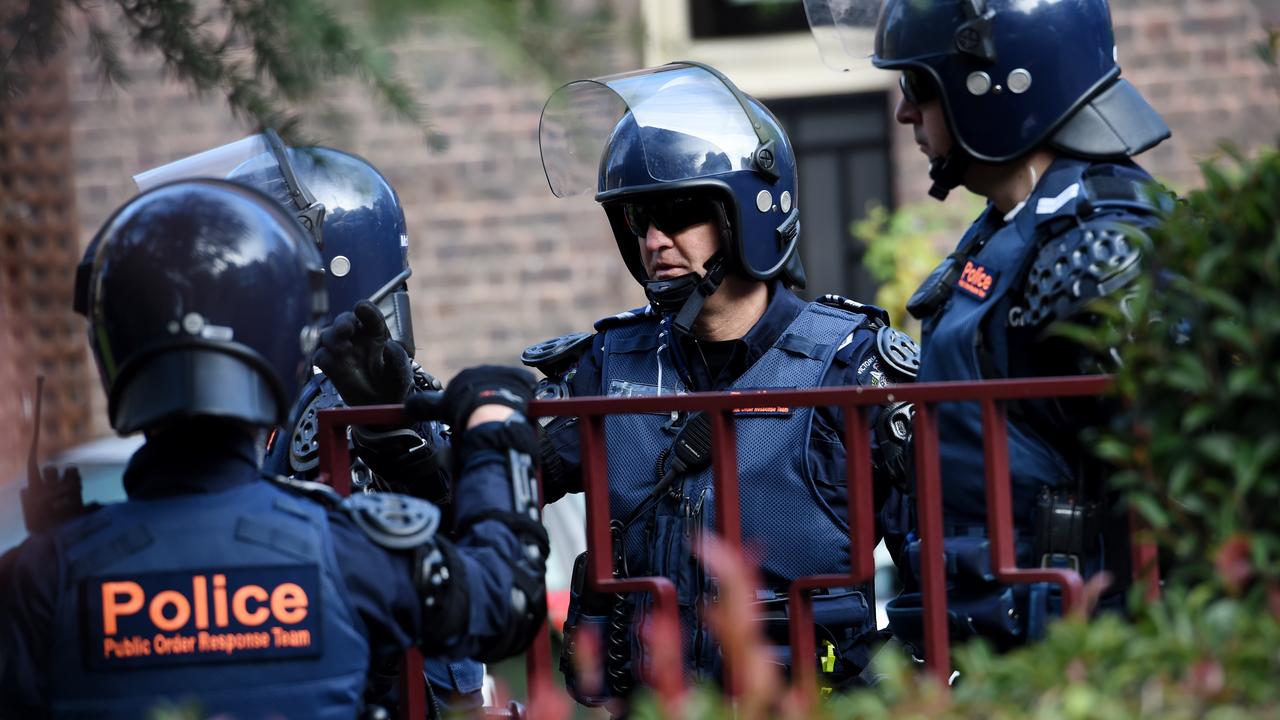
Cabinet minister Murray Watt lambasted the marches and hoped no trouble would ensue.
“We absolutely condemn the March for Australia rally that’s going on today,” he told Sky News.
“The fact that this is being organised and promoted by neo-Nazi groups tells us everything we need to know about the level of hatred and division that these kind of rallies are about.”
Liberal Senator James Paterson, who has long championed strict migration laws, said many Australians held sincere views on the topic.
However, he warned neo-Nazis would be present at the rallies, and expressed concern about the targeting of multicultural communities including Indian Australians, labelling it shameful and wrong.
NSW Police have their work cut out for them with hundreds of officers deployed to facilitate the Sydney marathon, a weekly pro-Palestine rally and the anti-immigration march in different parts of the city.
Commanders warned there would no tolerance for violent acts or criminal behaviour.
“If anyone wants to come along and hijack these assemblies and do the wrong thing … they will be arrested and charged,” Assistant Deputy Commissioner Peter McKenna told reporters.
Ahead of the marches, a flurry of social media posts claimed 1500 migrants were arriving in Australia each day, which was repeated on talkback radio.
However, the Australian Bureau of Statistics questioned the use of migration numbers, warning they were not an accurate reflection of immigration.
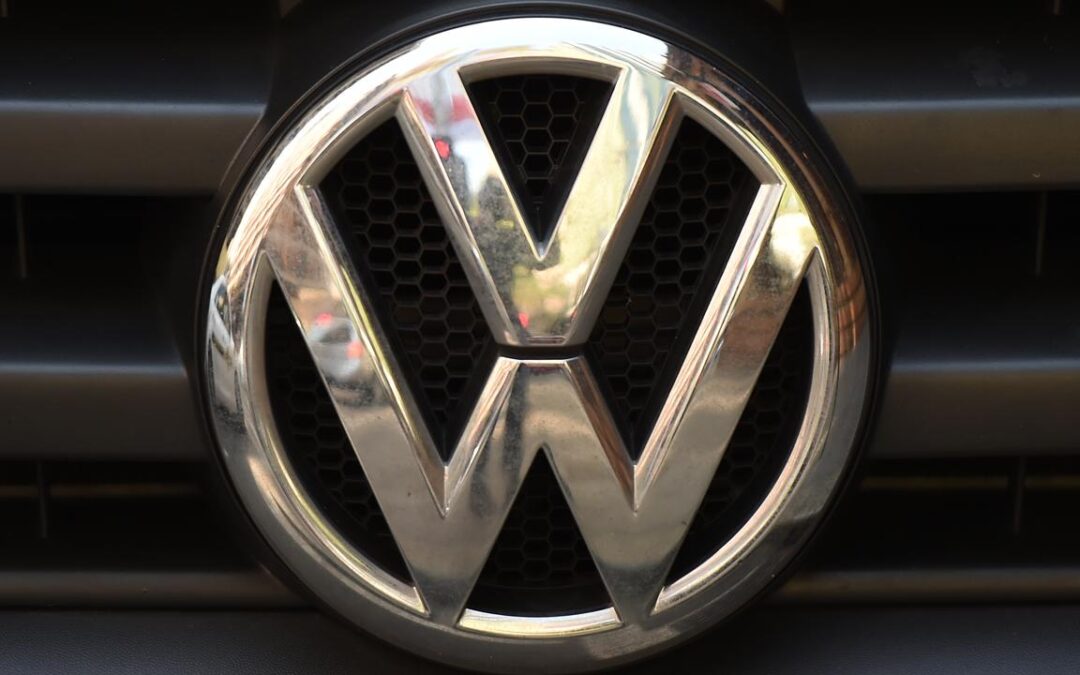
Volkswagen Brazil faces $46.5m fine over modern slavery
German car manufacturer Volkswagen has been handed a massive fine in Brazil over allegations of modern slavery on an Amazonian farm during the country’s military dictatorship.
A labour court, in the Amazonian state of Pará, on Friday ordered VW’s Brazilian subsidiary to pay compensation of 165 million reais ($A46.5 million) over the illegal exploitation of workers in the 1970s and 1980s, the Brazilian public prosecutor’s office for labour said.
According to the office, the fine is the highest ever imposed in Brazil for modern slave labour.
The VW subsidiary has announced it will appeal the decision.
“With a 72-year tradition, the company consistently upholds the principles of human dignity and strictly adheres to all applicable labour laws and regulations,” said Volkswagen do Brasil.
The allegations relate to conditions at the Fazenda Vale do Rio Cristalino farm, which belonged to a subsidiary of Volkswagen do Brasil.
The cattle farm was founded with the support of the military dictatorship as part of a national strategy to develop and colonise the Amazon region.
The investigation began in 2019 after priest Ricardo Rezende, then regional coordinator of the Rural Pastoral Commission, documented the case.
An out-of-court settlement failed in 2023.
As a result, the company was finally sued in December 2024.
According to the allegations, hundreds of temporary workers at the farm, also known as Fazenda Volkswagen, were subjected to long working days and degrading working conditions.
Armed guards and a system of debt bondage prevented the workers from leaving the farm, investigators said.